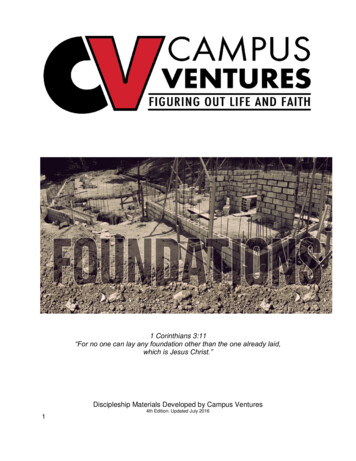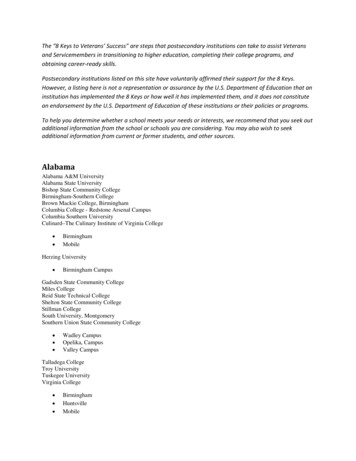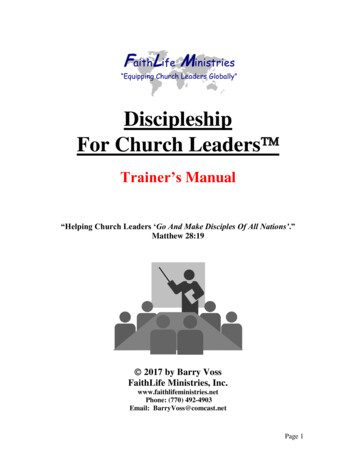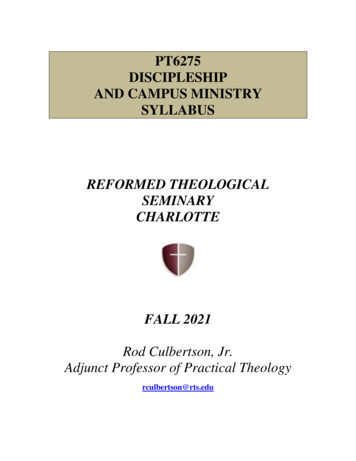
Transcription
PT6275DISCIPLESHIPAND CAMPUS MINISTRYSYLLABUSREFORMED THEOLOGICALSEMINARYCHARLOTTEFALL 2021Rod Culbertson, Jr.Adjunct Professor of Practical Theologyrculbertson@rts.edu
PT6275 DISCIPLESHIP AND CAMPUS MINISTRYREFORMED THEOLOGICAL SEMINARY-CHARLOTTEFall 2021DR. ROD CULBERTSON, JR.ASSOCIATE PROFESSOR OF PRACTICAL THEOLOGYCOURSE DESCRIPTIONThis course addresses the need for developing a philosophy of ministry that focuses on buildingfollowers of Christ among college students in particular. Attention is given to the concept ofdisciple-making in general, as well as to plans and strategies for creating a disciple-buildingenvironment that can be used in a campus ministry and/or in conjunction with a local churchlocated near a college or university campus. A Reformed theological and philosophical perspectivewill undergird the content of the course.COURSE OBJECTIVESCOGNITIVE (KNOW/UNDERSTAND)1. The student will learn various philosophies of ministry which influence methods of discipleship,particularly in a campus environment.2. The student will learn various areas of discipleship training and how to discern the needs ofothers who are growing as disciples.3. The student will learn how to recognize the qualities of a maturing and growing disciple ofJesus Christ and avenues to enhance such.4. The student will learn some of the various disciplines of the Christian life which enable one towalk daily with Christ for a lifetime.5. The student will consider various philosophies of ministry and learn how to write his/her ownpersonal philosophy of campus ministry statement.AFFECTIVE (FEEL/MOTIVATION)1. The student will gain a greater conviction for personal and corporate discipleship in a campusministry setting.2. The student will grow in his or her motivation to make disciples and to recognize potentialleaders and to train future campus/church ministry leaders.3. The student will grow in his or her desire to be involved in the lives of other believers and tobuild relationships with them which will foster their growth in faith.4. The student will deepen his or her passion for personal sanctification.5. The student will grow as a disciple himself or herself and in concern for his/her personal walkwith the Lord and the practice of the disciplines that foster such growth.VOLITIONAL (DO/COMPETENCIES)1. The student will write a personal philosophy of ministry statement which could be used in acampus or a church-related campus ministry.2. The student will write a plan for discipling a new believer in Christ.3. The student will have the option of actually engaging in the initial one-on-one discipleshipprocess with a college or university student.
Course Objectives Related to MDiv* Student Learning OutcomesCourse: PT6275 Discipleship and Campus MinistryProfessor: Dr. Rod Culbertson Campus: Charlotte Date: Fall 2021MDiv* Student Learning OutcomesIn order to measure the success of the MDiv curriculum, RTS has defined thefollowing as the intended outcomes of the student learning process. Each coursecontributes to these overall outcomes. This rubric shows the contribution of thiscourse to the MDiv outcomes.Rubric Mini-JustificationStrongModerateMinimalNone*As the MDiv is the core degree at RTS, the MDiv rubric will be used in this syllabus.Articulation(oral & written)ScriptureReformed TheologySanctificationDesire for rch/WorldBroadly understands and articulates knowledge, bothoral and written, of essential biblical, theological,historical, and cultural/global information, includingdetails, concepts, and frameworks.Significant knowledge of the original meaning ofScripture. Also, the concepts for and skill to researchfurther into the original meaning of Scripture and toapply Scripture to a variety of modern circumstances.(Includes appropriate use of original languages andhermeneutics; and integrates theological, historical,and cultural/global perspectives.)Significant knowledge of Reformed theology andpractice, with emphasis on the WestminsterStandards.Demonstrates a love for the Triune God that aids thestudent’s sanctification.Burning desire to conform all of life to the Word ofGod.Embraces a winsomely Reformed ethos. (Includes anappropriate ecumenical spirit with other Christians,especially Evangelicals; a concern to present theGospel in a God-honoring manner to non-Christians;and a truth-in-love attitude in disagreements.)Ability to preach and teach the meaning of Scriptureto both heart and mind with clarity and enthusiasm.Knowledgeable of historic and modern Christianworship forms; and ability to construct and skill tolead a worship service.Ability to shepherd the local congregation: aiding inspiritual maturity; promoting use of gifts and callings;and encouraging a concern for non-Christians, both inAmerica and worldwide.Ability to interact within a denominational context,within the broader worldwide church, and withsignificant public issues.NoneMinimalThe topic of hermeneutics iscovered, with a focus on applicationto Bible study and leading inmodified inductive small groupBible study.NoneModerateMinimalMinimalFocus is on growing one’s walk withthe Lord and how to help others dothe same.Growing as a disciple of Christ is allareas of life is a focus of the course.Relational abilities and sharing thelove of Christ with others isconsidered.NoneNoneModerateNonePastoring others and skills fordiscipling others is a primary focus.
REQUIRED TEXTBOOKS1. Coleman, Robert E. Master Plan of Evangelism, The (Paperback - April 1, 2006),109 pp.An excellent treatment of Jesus’ plan to evangelize the world though his disciples.A classic.2. Culbertson, Rod. The “Disciple Investing” Life (Paperback – January, 2017: Wipfand Stock) e.html 130 pp.3. Marshall, Colin and Payne, Tony. The Trellis and the Vine by 158 pp. (Hardcover- Jan. 1, 2009)An insightful philosophical approach to ministry that encourages maintaining anapproach to ministry based upon people and their needs in a setting in whichstructure counts.4. Setran, David P. and Kiesling, Chris A. Spiritual Formation in EmergingAdulthood. (Paperback – 2013), 239 pp.A tremendous diagnosis of the present generation that is emerging into thematurity of adulthood. Valuable as a recent text that studies college ageindividuals.5. In addition to the Required Reading list above, the student is required toread 250 pages from any of the “Recommended Textbooks” or “Books forDiscipleship Topics” below.RECOMMENDED TEXTBOOKS(Highly Recommended)1.2.3.4.5.6.7.8.9.Anderson, Neil T. Discipleship Counseling.Bonhoeffer, Dietrich. The Cost of Discipleship. (Mass Market Paperback - 1979)Bruce, Alexander B. The Training of the Twelve. (Paperback - Jun 1, 2007)Chan, Francis and Beuving, Mark. Multiply:Disciples Making Disciples.Coleman, Robert E. Master Plan of Discipleship, The. (Mass Market Paperback Dec 1, 1998)Cosgrove, Francis M., Jr. Essentials of Discipleship (A Navigator Book), 192pages, Navpress (1980)Dever,Mark Discipling: How to Help Others Follow Jesus (9Marks: BuildingHealthy Churches - Series: 9Marks: Building Healthy Churches (Book 8), 128pages, Crossway (2016)Erisman, Ken. Grounded in the Faith: An Essential Guide to Knowing What YouBelieve and Why Paperback, 288 pages, Baker Books (2013)Geiger, Eric; Kelley, Michael; Nation, Philip Transformational Discipleship: HowPeople Really Grow, 240 pages, B&H Books (2012)
10. Geiger, Eric; Peck, Kevin. Designed to Lead, 248 pages, B&H Books (2016)11. Hanks, Billie; Shell, William A. (Editors) Discipleship: Great Insights from theMost Experienced Disciple Makers, 192 pages, Zondervan (1993)12. Hendricks, Howard. As Iron Sharpens Iron. (A Promise Keepers Edition forMentoring Men)13. Hollinger, Dennis P. Head, Heart & Hands: Bringing Together ChristianThought, Passion And Action. (Paperback - May 5, 2005)14. Hull, Bill. Disciple-Making Church, The15. Hull, Bill. Disciple-Making Pastor, The: Leading Others on the Journey of Faith.(Paperback - Oct 1, 2007)16. Hull, Bill. Jesus Christ, Disciplemaker. (Paperback - Feb 1, 2004), 252 pp.A philosophy of disciple making based on a thorough examination of Jesus’disciple building, as exhibited in the Gospel accounts.17. Hull, Bill. The Complete Book of Discipleship: On Being and Making Followersof Christ. (The Navigators Reference Library). (Paperback - Oct 23, 2006)18. Clark, Chap. Hurt 2.0. Grand Rapids. MI: Baker Academic, 2011.19. Kuhatschek, Jack and Bunch, Cindy. How to Lead a Lifeguide Bible Study(Lifeguide Bible Studies). InterVarsity Press, 1967/2003, 59 pages.20. Kullberg, Kelly Monroe, Finding God at Harvard. Veritas Forum Books(Paperback – 1996/2007), 364 pages. Christians/dp/0830834338/ref sr 1 2?s books&ie UTF8&qid 1436961203&sr 12&keywords Kelly Kullberg&pebp 1436961216833&perid 0SD9THV8DRCKXXFBYTMG21. McCallum, Dennis and Lowery, Jessica Organic Disciplemaking: MentoringOthers Into Spiritual Maturity And Leadership. (Paperback - Jun 1, 2006)22. Mahaney, C. J. Why Small Groups.23. Malik, Charles. A Christian Critique of the University.24. Morley, Patrick. Pastoring Men: What Works, What Doesn't, and Why It MattersNow More Than Ever. (Hardcover - Nov 1, 2008). A strategy for reaching menand helping them to grow spiritually.25. Ogden, Greg. Discipleship Essentials (Easy Read Large Bold Edition): A Guide toBuilding your Life in Christ. (Paperback - May 11, 2009)26. Ogden, Greg. Transforming Discipleship: Making Disciples a Few at a Time.(Paperback - May 2003), 198 pp.27. Parrett, Gary and Packer, J. I. Grounded in the Gospel: Building Believers theOld-Fashioned Way, 240 pages, Baker Books (2010)28. Pope, Randy Insourcing: Bringing Discipleship Back to the Local Church(Leadership Network Innovation Series), 224 pages, Zondervan (March 19, 2013)29. Sanders, J .Oswald. Spiritual Discipleship: Principles of Following Christ forEvery Believer. (Paperback - Jul 1, 2007), 175 pp. A serious look at the callingand demands involved in being a true disciple of Jesus Christ.30. Smallman, Stephen. What is Discipleship? (pamphlet)31. Spader, Dann. 4 Chair Discipling: Growing a Movement of Disciple-Makers
160 pages, Moody Publishers; New edition (August 1, 2014)32. Traina, Robert A. Methodical Bible Study (Paperback - Jan 1, 2002) A book onbasic hermeneutics; helpful for leading modified inductive Bible studies33. Turner, John G. Bill Bright and Campus Crusade for Christ: The Renewal ofEvangelicalism in Postwar America. (Paperback - Mar 6, 2008) An analytical andcritical history of Campus Crusade for Christ (CRU)34. Wald, Oletta, The New Joy of Discovery in Bible Study. by Oletta Wald(Paperback - Jan. 4, 2002)35. Wald, Oletta, The New Joy Of Teaching Discovery Bible Study (New Joy ofDiscovery). by Oletta Wald (Paperback - May 30, 2002)36. Wilson, Carl. With Christ in the School of Disciple Building a Study of Christ’sMethod of Building Disciples. (Paperback - 1978)37. Whitney, Donald S. Spiritual Disciplines within the Church: Participating Fullyin the Body of Christ Paperback, 216 pages, Moody Publishers (1996)BOOKS FOR DISCIPLESHIP TOPICS1. Boice, James Montgomery. Christ's Call to Discipleship. (Paperback - Aug 14,1998), 169 pp.2. Ferguson, Sinclair B. Taking the Christian Life Seriously: Biblical Teaching onChristian Maturity. (Paperback - 1981)3. Grudem, Wayne and Grudem, Elliot Christian Beliefs: Twenty Basics EveryChristian Should Know. (Paperback - Nov 1, 2005)4. Kennedy, D. James. Truths That Transform.5. Mack, Wayne A. and Johnston, Wayne Erick. A Christian Growth andDiscipleship Manual, Volume 3: A Homework Manual for Biblical Living.(Paperback - Oct 2005)6. Ryle, J.C. Holiness.7. Smallman, Stephen. The Walk.8. White, John. The Fight.SUGGESTED READING1. Adsit, Christopher Personal Disciplemaking -StepChristian/dp/1579020224/ref sr 1 1?ie UTF8&qid 1515879761&sr 81&keywords Adsit%2C Christopher Personal Disciplemaking2. Barna, George. Growing True Disciples: New Strategies for Genuine Followers ofChrist. (Hardcover - Oct 16, 2001)3. Boice, James Montgomery. How to Live the Christian Life. (Paperback - Mar1982)4. Bomar, Chuck. College Ministry From Scratch.5. Bonhoeffer, Dietrich. Discipleship (Dietrich Bonhoeffer Works, Vol. 4).(Paperback - Jun 1, 2003)
6. Bonhoeffer, Dietrich. Life Together: The Classic Exploration of Faith inCommunity. (Paperback - Oct 25, 1978)7. Breen, Michael. Building a Discipleship Culture.8. Edwards, Jonathan. Faith Beyond Feelings.9. Eims, LeRoy (The Navigators). The Lost Art of Disciple Making. (Paperback - Jul29, 1978)10. Fryling, Alice. Disciple-Makers Handbook. (Paperback - Jan 1, 1989)11. Geiger, Eric, Kelly, Michael and Nation, Philip. Transformational Discipleship.12. Hadidian, Allen. Discipleship.13. Harper, Norman E. Making Disciples. Memphis: Christian Studies Center, 1981,178 pages.14. Jamieson, Bobby. Growing One Another: Discipleship in the Church. (9 Marks)15. Joiner, Reggie, Chuck Bomar, and Abbie Smith. The Slow Fade: Why You Matterin the Story of Twenty Somethings. Colorado Springs, CO: David C. Cook, 2010.16. Kullberg, Kelly Monroe. Finding God at Harvard.17. Lawless, Chuck. Mentor: How Along-the-Way Discipleship Will Change YourLife.18. Ligon, Greg. Bonhoeffer's Cost of Discipleship. (Shepherd's Notes. ChristianClassics) (Paperback - Jan 1999)19. Lutz, Stephen. Campus Ministry in a Post-Christian Culture.20. Macchia, Stephen A. Becoming a Healthy Disciple.21. MacDonald, William. True Discipleship. (Paperback - Jun 6, 2003)22. Morley, Patrick. A Man's Guide to the Spiritual Disciplines: 12 Habits toStrengthen Your Walk With Christ. (Hardcover - Feb 1, 2007)23. Morley, Patrick. Discipleship for the Man in the Mirror. (Paperback - May 1,2002)24. Morley, Patrick. The Man in the Mirror: Solving the 24 Problems Men Face.(Paperback - Oct 2000)25. Peterson, Eugene H. A Long Obedience in the Same Direction: Discipleship in anInstant Society. (Paperback - Jul 2000)26. Petersen, Jim, Lifestyle Discipleship: The Challenge of Following Jesus inToday's World. (The Navigators)27. Putnam, Jim. Real Life Discipleship.28. Rainer, Thom S. and Geiger, Eric. Simple Church: Returning to God's Process forMaking Disciples. (Hardcover - Jun 1, 2006)29. Senter, Mark. Four Views of Youth Ministry and the Church.30. Skinner, Betty Lee. Daws: A Man Who Trusted God.31. Sire, James. Discipleship of the Mind.32. Stanley, Andy and Willits, Bill. Creating Community: Five Keys to Building aSmall Group Culture. By Andy Stanley and Bill Willits (Hardcover - Dec. 31,2004)33. Willard, Dallas. The Great Omission: Reclaiming Jesus' Essential Teachings onDiscipleship. (Hardcover - Jun 13, 2006)
REQUIREMENTS AND EVALUATIONI.CLASS ATTENDANCE AND INVOLVEMENTYou will be expected to attend class and to participate in the class discussion and activities,especially as we interact with the textbooks and assigned reading, as well as the requiredpapers. Excessive absences will jeopardize your grade.II. READING OF TEXTBOOKS (25% of course grade)Textbook reading will be graded based on discussions and an honor system assessment onthe final exam, in which the student will be asked the actual amount of reading he or she hasdone.III. PAPERS: Two papers are required for the course.Papers must (Please note: you can lose points here): Be double-spacedBe numberedBe written with 12 point/Times Roman typeset and standard margins.SUBMITTED by the time of class on the assigned due date.Any questions: follow the Chicago style.A. PHILOSOPHY OF DISCIPLE-MAKING STATEMENT (20% of course grade)Write out an entire personal philosophy of ministry statement for a campus ministry, basedupon the concepts and guidelines discussed in class.Length: At least 6 pages.Due: November 2.B. AREAS OF DISCIPLE-MAKING PAPER (35% of course grade)Develop a plan for discipling a new believer in Christ. Choose at least ten topics, one passageof Scripture (at least 5 verses in context) which will cover the topic and at least ten (10)questions per passage which will walk the student through the text in an interactive manner.Length: Whatever it takes.Due: November 30.C. OPTIONAL: INTEGRATION EXPERIENCE PAPER (20%)In lieu of the final exam, the seminary student can choose the following option: Ask a localcollege or university student (of the same sex) to meet with him or her for six (6) one-hourmeetings to be “discipled” throughout the course of the semester. Write a four-pagesummary of the meetings and what was accomplished. Answer these or similar questions:
“What was discussed in the meetings?” “What was learned?” “What was studied?” “Whatproblems or challenges arose in the relational context?” “What are your reactions to theprocess?” “Where do you need help in a ministry approach of this type?” Be certain tomaintain appropriate confidentially in the paper as to the student’s identity and otherpersonal issues.NOTE: The student must inform the professor regarding his or her choice of this option bythe fifth class meeting (September 28) in order for this choice to become a substitute for apaper or the final exam. No exceptions.Length: 4 pagesDue: Exam WeekVI. FINAL EXAM (15%)You will be responsible for the material covered in all of the lectures, as well as the basiccontent of Robert Coleman’s Master Plan of Evangelism.ACADEMIC POLICIESPOLICY ON CHEATING AND PLAGIARISM: Cheating is the use of another person’s workon behalf of your own work, with the assumption being that it is your work. The MLA Handbookfor Writers of Research Papers says, “To plagiarize is to give the impression that you have writtenor thought something that you have in fact borrowed from someone else.” Plagiarism is the use ofideas, information and content from a particular source without giving credit to that source byfootnoting the source or accounting for it in a bibliography. Cheating will result in an automaticzero (0) grade for the assignment, paper or exam involved. Plagiarism, whether intentional orunintentional, is considered academic theft. The RTS academic consequences of plagiarism are asfollows: 1) First offense: The student must rewrite the paper and receive no better than a passing“D” grade for it. 2) Second offense: The student fails the entire course.POLICY ON LATE WORK: Any work turned in late and without either a written excuse orprevious permission granted by the professor will be docked three points/day for that assignment.Excuses for late work will be accepted for dire medical needs or reasons or other extremeemergencies.POLICY ON GRAMMAR AND SPELL CHECK: Any work turned in which appears to lack“proofing” or displays poor grammar will receive a small penalty affecting the grade.
PT6275 Discipleship and Campus MinistryReformed Theological SeminaryFall 2021 ScheduleDr. Rod Culbertson, Jr.Associate Professor of Practical TheologySESSIONDATE TOPIC108/31209/07 Introduction (Cont.); The Nature and Development of the Student; TheCampus Demographic309/14Balanced Discipleship: The Three Domains409/21Developing a Philosophy of Ministry (Coleman)509/28Campus POMs610/05Methods and Models of Discipleship10/12FALL READING WEEK710/19How the Campus Worker/Minister Comes; How the Student Comes810/26Diagnosis and Counseling911/02Areas of Discipleship Philosophy of Ministry Statement Due1011/09Areas of Discipleship1111/16Modified Inductive Bible Study: The Method and the Small Group Dynamic1211/23Modified Inductive Bible Study: The Use of Questions1311/30Modified Inductive Bible Study: Implementation Areas of Discipleship Paper DueFinal ExamsIntroduction to the Concept of Disciple-Investing (Take Home/Short Essay) or Integrative Experience Paper
RTS Charlotte Classroom Technology UsageRTS Charlotte recognizes how essential it is for students to have reliable, campus-wide access to theinternet. For that reason, we have made Wi-Fi available for our student body, not only in the library andstudent lounges, but also in the classrooms. We know that students need to use the internet to downloadclass materials, access files on the Cloud, and locate other important information. However, we alsorecognize that internet access in the classroom provides opportunity for abuse and misuse. Some studentshave unfortunately used their internet access to engage in many activities that distract them from theclassroom lectures (e.g., surfing the web, checking sports scores, playing games). Not only does suchactivity hamper a student’s own seminary education, but it distracts other students who can easily viewthe screens of nearby students. In addition, donors and classroom guests (who often sit in the back) cansee this inappropriate internet usage, which reflects poorly on RTS. Classroom etiquette includes leavingcell phones turned off, refraining from surfing the Internet or playing computer games or other distractingactivities. In addition, students must respect standards set by individual professors regarding the use oftechnology during their class.In order to address this issue, we must appeal to the integrity of the students as ones who are preparingfor a lifetime of ministry to Christ and his church. We expect each student to take personal responsibilityfor proper classroom technology usage and to encourage others around them to do the same. All RTSCharlotte students are accountable to the policies stated in the Student Handbook and Academic Catalogand are therefore expected to use technology in the classroom only for appropriate class-relatedactivities. Student conduct is under the supervision of the Dean of Students.
Student Instructions for Exams with LockDown Browser1.Install the LockDown Browser application on the computer you intend to use for exams, prior tositting for the exam, using this oad.php?id 998253613 This link is ONLY for RTS students and covers Mac and Windows applications.Be sure that you are able to login to your Canvas account from the LockDown Browser beforescheduling a time to take your exam.The LockDown Browser application is already installed on the computers in the RTS Charlottelibrary. (Note that if you elect to use the library computers, your proctor must still be presentthroughout the duration of the exam.)If you use internet filtering software (for example, Covenant Eyes) you may need to disable itbefore beginning an exam with LockDown Browser. Some types of filtering software can blockyour computer’s connection to Canvas. Also, please be sure to add an exception for our CanvasURL: https://rts.instructure.com2.Make arrangements with a proctor to supervise the exam within the date timeframe set by theprofessor. The proctor cannot be a family member, current RTS student (current taken a classwithin the past year but not yet graduated), or member of the library staff. Typical proctors arepastors or church staff members. The document “Procter Expectations Letter.doc” has beenprovided on your Canvas homepage in order to facilitate communication with your proctor. Foryour convenience, there will be several on-campus proctor blocks where a proctor will be availableto supervise your exam. Dates and times will be posted on Canvas and announced in the weeklySemper.3.The proctor must observe student taking exam and ensure that there are no devices or resourcesavailable other than the computer being used for the exam.4.Access the exam during the date window specified for that midterm:a. Start the LockDown Browser application using a wired or known reliable WIFIconnection. We do not recommend using restaurant or coffee shop WIFI to take exams.b. Have your student ID number available to input into the exam.c. If you use internet filtering software, you may need to disable it before beginning an examwith LockDown Browser.d. Login to your Canvas account using your Self-Service username and password. If youneed to reset your Self-Service password, you may do so at https://selfservice.rts.edu .e. Navigate to the exam. You will not be able to access the exam with a standard webbrowser. For additional details on using LockDown Browser, review this Student QuickStart Guide (PDF).f. Time clock will begin once you open the exam.g. Exam must be completed in one sitting. You may not exit and return to exam later.h. The exam will contain questions requiring the proctor contact information, an honorpledge, and certification that your proctor was present during the entire exam period.5.Proctors may be contacted to verify information regarding exam administration.6.In the rare case of a technical issue (for example, if internet service goes out during exam), theproctor should contact the course TA. While the TA’s may not be immediately available, the dateand time of the email will document when the issue was reported. Please have your TA’s contact
information available for your proctor before opening the exam. Once you open the exam usingthe LockDown Browser, you will not be able to access other programs on your computers.
pt6275 discipleship and campus ministry reformed theological seminary-charlotte fall 2021 dr. rod
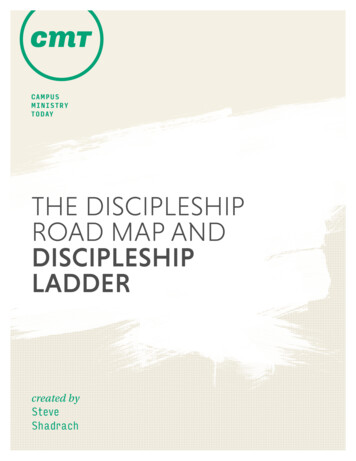
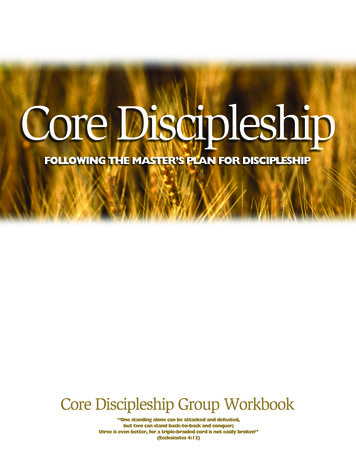
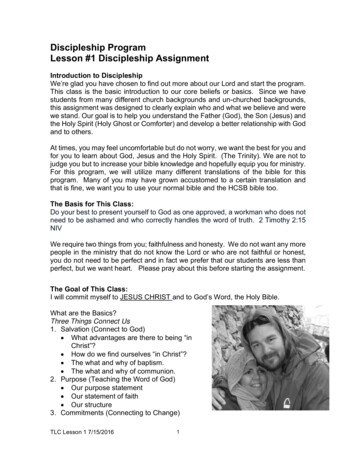
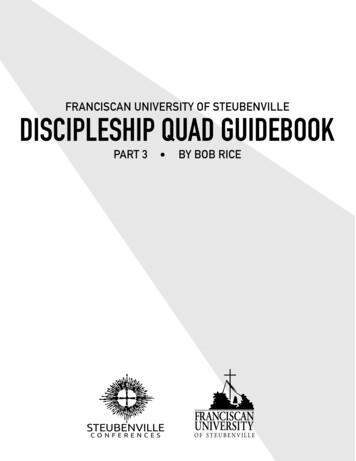
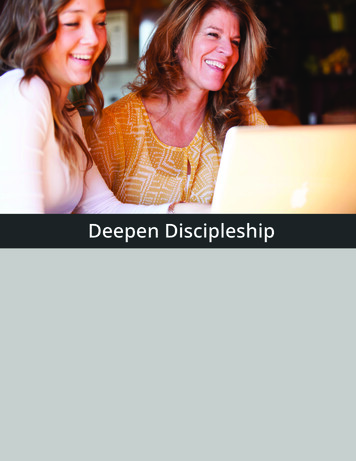
![Foundations for Discipleship [The Document].doc](/img/23/foundationsfordiscipleship-thedocument.jpg)

